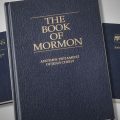Question
Dear Gramps,
I was reading the Bible, and in Genesis 6 the Nephilim was mentioned. It started to mention that they were sinful beings and that’s one of the reasons God ordained the flood. Why then, do we look up to Nephi in the Book of Mormon? Hope you have a great day!
Koda
Answer
Koda,
I’m afraid you’ve come across a faulty etymology and a common misconception at the same time.
You may notice that Lehi named his first two sons with proper Hebrew names (Laman and Lemuel). But Sam and Nephi got Egyptian names. We suppose because his merchant business had finally spread to Egypt by that time in his life. Nephi also mentions that part of his education was of the Egyptian language.
Just to be thorough, “Sam” is not a Jewish name. Samuel is. But the names “Sam” and “Nephi” are simply not found among ancient Jewish records.
Let’s take a look at the word Naphilim. Notice that I use a slightly different spelling because that would be a more accurate transliteration. But that may not mean much since the vowels in Hebrew tend to not mean much.
The word is often translated as “giants.” But the common understanding is that the word comes from “fallen.” Naphal is the Hebrew word for “to fall.” Again, vowels tend to not mean much in Hebrew. So, which is it? Giants? Fallen men? No one knows. It is an ancient word with no proper context.
How “the fallen” came to mean “giants” is anyone’s guess. But that is all it has ever been — a guess. Many scholars have supposed that due to the language of Genesis 6:4 that the Naphilim were created by fallen angels having sex with mortal women and formed a giant race. But the wording in the verse doesn’t say that. The Naphilim were mentioned as existing. But it doesn’t say what or who they were.
The remainder of the verse is often misinterpreted. LDS teachings say that the ancient meaning of this passage was that the “Sons of God” were men who held the priesthood and were of the true faith. It was these men who had fallen, not angels.
Were these Naphilim actually the children of these fallen men of the priesthood? We have no knowledge of that. The way the verse is written, various pronouns could be linked to multiple antecedents. And each phrase could be read to mean a dozen different things.
For all we know they could refer to animals that simply don’t exist today — perhaps Gorillas or other similar humanoid creatures.
Bottom line is: We really don’t know who or what the Naphilim were.
Now, to your question about why we look up to Nephi is a different matter. We don’t look up to him because of his name. I’m not sure if we actually “look up” to him at all. He was certainly a pretty good man who tried his best to obey the Lord. And if we do look up to him, that is why. His soul and example, not his name.
As Juliet said,
“A rose by any other name would smell as sweet.”
It has nothing to do with his name whether of good, bad, or indifferent origin. It was because he was a pretty good guy by whatever name he was given.
Gramps







